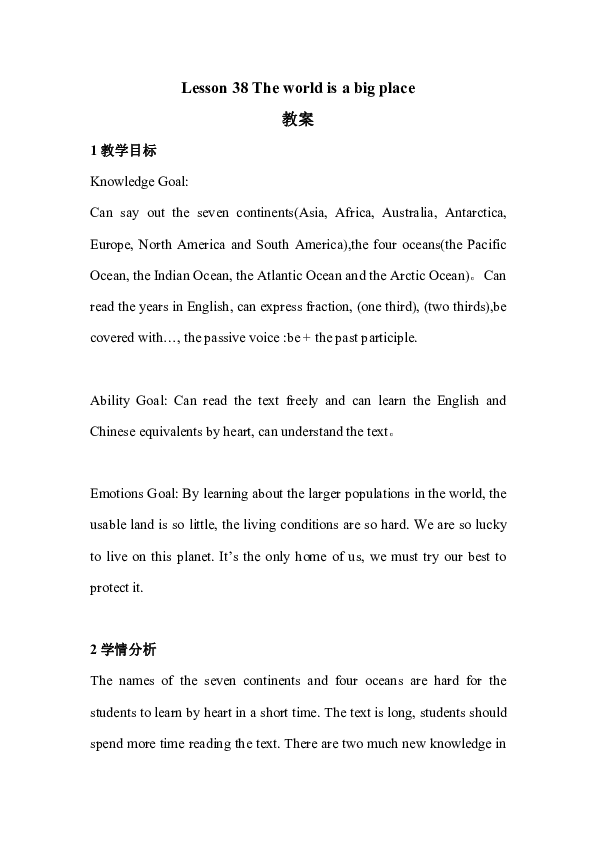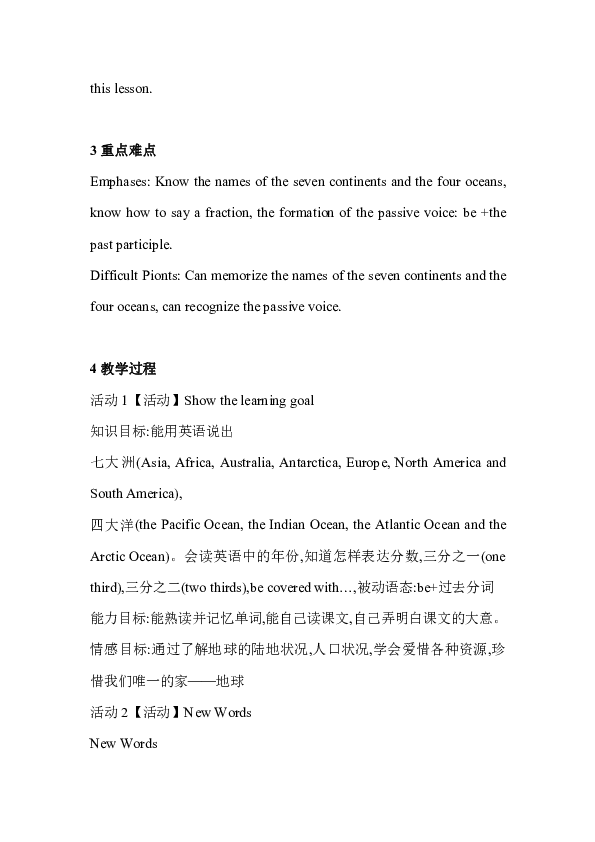Lesson 38 The world is a big place 教案
文档属性
| 名称 | Lesson 38 The world is a big place 教案 |

|
|
| 格式 | zip | ||
| 文件大小 | 118.8KB | ||
| 资源类型 | 教案 | ||
| 版本资源 | 冀教版 | ||
| 科目 | 英语 | ||
| 更新时间 | 2017-03-23 00:00:00 | ||
图片预览



文档简介
Lesson
38
The
world
is
a
big
place
教案
1教学目标
Knowledge
Goal:
Can
say
out
the
seven
continents(Asia,
Africa,
Australia,
Antarctica,
Europe,
North
America
and
South
America),the
four
oceans(the
Pacific
Ocean,
the
Indian
Ocean,
the
Atlantic
Ocean
and
the
Arctic
Ocean)。Can
read
the
years
in
English,
can
express
fraction,
(one
third),
(two
thirds),be
covered
with…,
the
passive
voice
:be
+
the
past
participle.
Ability
Goal:
Can
read
the
text
freely
and
can
learn
the
English
and
Chinese
equivalents
by
heart,
can
understand
the
text。
Emotions
Goal:
By
learning
about
the
larger
populations
in
the
world,
the
usable
land
is
so
little,
the
living
conditions
are
so
hard.
We
are
so
lucky
to
live
on
this
planet.
It’s
the
only
home
of
us,
we
must
try
our
best
to
protect
it.
2学情分析
The
names
of
the
seven
continents
and
four
oceans
are
hard
for
the
students
to
learn
by
heart
in
a
short
time.
The
text
is
long,
students
should
spend
more
time
reading
the
text.
There
are
two
much
new
knowledge
in
this
lesson.
3重点难点
Emphases:
Know
the
names
of
the
seven
continents
and
the
four
oceans,
know
how
to
say
a
fraction,
the
formation
of
the
passive
voice:
be
+the
past
participle.
Difficult
Pionts:
Can
memorize
the
names
of
the
seven
continents
and
the
four
oceans,
can
recognize
the
passive
voice.
4教学过程
活动1【活动】Show
the
learning
goal
知识目标:能用英语说出
七大洲(Asia,
Africa,
Australia,
Antarctica,
Europe,
North
America
and
South
America),
四大洋(the
Pacific
Ocean,
the
Indian
Ocean,
the
Atlantic
Ocean
and
the
Arctic
Ocean)。会读英语中的年份,知道怎样表达分数,三分之一(one
third),三分之二(two
thirds),be
covered
with…,被动语态:be+过去分词
能力目标:能熟读并记忆单词,能自己读课文,自己弄明白课文的大意。
情感目标:通过了解地球的陆地状况,人口状况,学会爱惜各种资源,珍惜我们唯一的家——地球
活动2【活动】New
Words
New
Words
Get
the
students
try
to
read.
Then
the
teacher
teach,
students
repeat.
First
let
them
know
the
equivalent’s
meaning.
Memorize
the
words
for
three
minutes.
After
that,
give
students
a
test
to
see
which
group
is
the
best.
Perhaps
each
group
has
ten
chances
to
say
the
equivalent.
One
right
answer
is
one
mark.
There
are
also
some
pictures
to
help
students
understand
the
words.
Planet
n.行星
billion
n.十亿,千兆
total
n.&adj.总计,总数;总的,总计的
increase
v.增加,增大
surface
n.表面,表层
Indian
adj.&n.印度的,印度人
Atlantic
n.&adj.大西洋(的)
Arctic
adj.北极的
活动3【活动】Listen and repeat
Listen
and
repeat.
Have
the
students
listen
to
the
recording.
Tell
them
to
follow
the
recording
while
they
are
listening.
活动4【活动】Read and answer.
Read:
Have
the
students
to
read
in
groups.
The
teacher
calls
which
group,
the
group
continue
reading.
Answer:
Give
students
five
minutes
to
read
the
text
and
find
out
the
answers
to
these
ten
questions.
1.
How
many
continents
does
the
world
have
What
are
they
2.
How
many
oceans
does
the
world
have
What
are
they
3.
When
was
the
world’s
population
over
7
billion
in
total
4.
When
will
the
world
have
about
8
billion
people
5.
When
may
the
world’s
population
reach
9
billion
6.
What’s
the
problem
the
earth
faces
7.
How
much
of
our
earth’s
surface
is
land
8.
How
much
of
the
earth’s
surface
is
oceans
9.
Why
can’t
people
live
on
Antarctica
10.
What
are
the
names
for
different
parts
of
the
big
ocean
活动5【讲授】Show
and
instruct
the
emphases.
a)
How
many
continents
and
oceans
does
the
world
have (have
与there
be互换)
b)
How
many
continents
and
oceans
are
there
in
the
world
c)
planet行星
eg.
The
earth
is
a
planet.
d)
star
恒星
eg.
The
sun
is
a
star.
e)
face
名词:脸;面孔
动词:面朝;面对;面临
f)
年份的读法:2010读作:twenty
ten
g)
2025读作:twenty
twenty-five
h)
2050读作:twenty
fifty
i)
by
2025
by:
到……之前;不迟于
j)
hundred,
thousand,
million,
billion这些都是英语的计数单位与具体数字连用不加S,除非短语hundreds
of,
thousands
of,
millions
of,
billions
of
k)
分数的读法,
分子用基数词,分母用序数词。
l)
These
dry
places
are
called
deserts.
i.
be
+过去分词
构成被动语态
ii.
It
must
be
treated
well.
被动语态
m)
all
year
round
一年到头
n)
be
covered
with…
覆盖着……
活动6【作业】Homework
Write
a
short
passage
about
how
to
protect
our
only
home———
the
earth.
38
The
world
is
a
big
place
教案
1教学目标
Knowledge
Goal:
Can
say
out
the
seven
continents(Asia,
Africa,
Australia,
Antarctica,
Europe,
North
America
and
South
America),the
four
oceans(the
Pacific
Ocean,
the
Indian
Ocean,
the
Atlantic
Ocean
and
the
Arctic
Ocean)。Can
read
the
years
in
English,
can
express
fraction,
(one
third),
(two
thirds),be
covered
with…,
the
passive
voice
:be
+
the
past
participle.
Ability
Goal:
Can
read
the
text
freely
and
can
learn
the
English
and
Chinese
equivalents
by
heart,
can
understand
the
text。
Emotions
Goal:
By
learning
about
the
larger
populations
in
the
world,
the
usable
land
is
so
little,
the
living
conditions
are
so
hard.
We
are
so
lucky
to
live
on
this
planet.
It’s
the
only
home
of
us,
we
must
try
our
best
to
protect
it.
2学情分析
The
names
of
the
seven
continents
and
four
oceans
are
hard
for
the
students
to
learn
by
heart
in
a
short
time.
The
text
is
long,
students
should
spend
more
time
reading
the
text.
There
are
two
much
new
knowledge
in
this
lesson.
3重点难点
Emphases:
Know
the
names
of
the
seven
continents
and
the
four
oceans,
know
how
to
say
a
fraction,
the
formation
of
the
passive
voice:
be
+the
past
participle.
Difficult
Pionts:
Can
memorize
the
names
of
the
seven
continents
and
the
four
oceans,
can
recognize
the
passive
voice.
4教学过程
活动1【活动】Show
the
learning
goal
知识目标:能用英语说出
七大洲(Asia,
Africa,
Australia,
Antarctica,
Europe,
North
America
and
South
America),
四大洋(the
Pacific
Ocean,
the
Indian
Ocean,
the
Atlantic
Ocean
and
the
Arctic
Ocean)。会读英语中的年份,知道怎样表达分数,三分之一(one
third),三分之二(two
thirds),be
covered
with…,被动语态:be+过去分词
能力目标:能熟读并记忆单词,能自己读课文,自己弄明白课文的大意。
情感目标:通过了解地球的陆地状况,人口状况,学会爱惜各种资源,珍惜我们唯一的家——地球
活动2【活动】New
Words
New
Words
Get
the
students
try
to
read.
Then
the
teacher
teach,
students
repeat.
First
let
them
know
the
equivalent’s
meaning.
Memorize
the
words
for
three
minutes.
After
that,
give
students
a
test
to
see
which
group
is
the
best.
Perhaps
each
group
has
ten
chances
to
say
the
equivalent.
One
right
answer
is
one
mark.
There
are
also
some
pictures
to
help
students
understand
the
words.
Planet
n.行星
billion
n.十亿,千兆
total
n.&adj.总计,总数;总的,总计的
increase
v.增加,增大
surface
n.表面,表层
Indian
adj.&n.印度的,印度人
Atlantic
n.&adj.大西洋(的)
Arctic
adj.北极的
活动3【活动】Listen and repeat
Listen
and
repeat.
Have
the
students
listen
to
the
recording.
Tell
them
to
follow
the
recording
while
they
are
listening.
活动4【活动】Read and answer.
Read:
Have
the
students
to
read
in
groups.
The
teacher
calls
which
group,
the
group
continue
reading.
Answer:
Give
students
five
minutes
to
read
the
text
and
find
out
the
answers
to
these
ten
questions.
1.
How
many
continents
does
the
world
have
What
are
they
2.
How
many
oceans
does
the
world
have
What
are
they
3.
When
was
the
world’s
population
over
7
billion
in
total
4.
When
will
the
world
have
about
8
billion
people
5.
When
may
the
world’s
population
reach
9
billion
6.
What’s
the
problem
the
earth
faces
7.
How
much
of
our
earth’s
surface
is
land
8.
How
much
of
the
earth’s
surface
is
oceans
9.
Why
can’t
people
live
on
Antarctica
10.
What
are
the
names
for
different
parts
of
the
big
ocean
活动5【讲授】Show
and
instruct
the
emphases.
a)
How
many
continents
and
oceans
does
the
world
have (have
与there
be互换)
b)
How
many
continents
and
oceans
are
there
in
the
world
c)
planet行星
eg.
The
earth
is
a
planet.
d)
star
恒星
eg.
The
sun
is
a
star.
e)
face
名词:脸;面孔
动词:面朝;面对;面临
f)
年份的读法:2010读作:twenty
ten
g)
2025读作:twenty
twenty-five
h)
2050读作:twenty
fifty
i)
by
2025
by:
到……之前;不迟于
j)
hundred,
thousand,
million,
billion这些都是英语的计数单位与具体数字连用不加S,除非短语hundreds
of,
thousands
of,
millions
of,
billions
of
k)
分数的读法,
分子用基数词,分母用序数词。
l)
These
dry
places
are
called
deserts.
i.
be
+过去分词
构成被动语态
ii.
It
must
be
treated
well.
被动语态
m)
all
year
round
一年到头
n)
be
covered
with…
覆盖着……
活动6【作业】Homework
Write
a
short
passage
about
how
to
protect
our
only
home———
the
earth.
同课章节目录
- Unit 1 Spring Is Coming
- Lesson 1 How's the weather?
- Lesson 2 It's Getting Warmer!
- Lesson 3 Sun Is Rising
- Lesson 4 The Spring City
- Lesson 5 Babysitting on a Spring Day
- Lesson 6 Stories about Spring
- Unit 2 Plant a Plant
- Lesson 7 Planting Trees
- Lesson 8 Why Are Plants Important?
- Lesson 9 Gardening with Mary
- Lesson 10 Make Your Garden Grow!
- Lesson 11 Amazing Plants
- Lesson 12 Danny's Plant
- Unit 3 Animals Are Our Friends
- Lesson 13 Danny's Big Scare
- Lesson 14 Amazing Animals
- Lesson 15 The Zoo Is Open
- Lesson 16 The Pear Escaped
- Lesson 17 Save the Tigers
- Lesson 18 Friendship Between Animals
- Unit 4 The Internet Connects Us
- Lesson 19 How Do You Use the Internet?
- Lesson 20 A Computer Helps!
- Lesson 21 Books or Computers?
- Lesson 22 Travel on the Internet
- Lesson 23 The Internet--Good or Bad?
- Lesson 24 An E-mail to Grandpa
- Unit 5 Buying and Selling
- Lesson 25 Raising Money
- Lesson 26 Cookies, Please!
- Lesson 27 Business English
- Lesson 28 Ms. Liu's Great Idea
- Lesson 29 How to Push a Product
- Lesson 30 A Cookie Sale
- Unit 6 Be a Champion!
- Lesson 31 Don't Fall, Danny
- Lesson 32 My Favourite Record
- Lesson 33 2800 Years of Sports
- Lesson 34 Modern Olympics
- Lesson 35 The Dream Team
- Lesson 36 Classroom Olympics
- Unit 7 Know Our World
- Lesson 37 Let's Learn Geography!
- Lesson 38 The World Is a Big Place
- Lesson 39 Ring Up or Call?
- Lesson 40 Body Language
- Lesson 41 A Class of the World
- Lesson 42 North America
- Unit 8 Save Our World
- Lesson 43 Let's Clean Up!
- Lesson 44 Environment Clubs
- Lesson 45 Let's Sort Garbage!
- Lesson 46 Protect Our Environment
- Lesson 47 Connected to Nature
- Lesson 48 Garbage Is Interesting!
